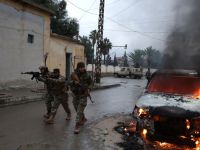Oil-producers will make further output cuts before March if the price of OPEC basket falls below $22 a barrel, Kuwait's Oil Minister Sheikh Saud Nasser al-Sabah said Thursday.
"If we find that the oil price dropped below the minimum limit which is $22 a barrel, we will activate the price band mechanism" which stipulates that the price of oil should remain between $22 and $28 a barrel, the minister said.
"If price drops below that level, another decision to cut output will be taken," Sheikh Saud told reporters on his return from Vienna, where he attended an OPEC meeting that decided to slash output by 1.5 million barrels per day (bpd).
Sheikh Saud praised the decision as essential to boost oil prices and stabilise the market. "I believe the decision to cut the output by 1.5 million bpd is wise. Its a precautionary measure for the spring and summer" when demand for oil is expected to fall.
"It will certainly lead to stability in the oil market, boost the current prices and stabilize it (in the future)," the minister said.
"We have agreed that the situation would be constantly monitored, and if measures are necessary to boost prices, they will be taken even before the forthcoming OPEC meeting in March," he said.
Under the new OPEC production quota, which will come into force from February 1, Kuwait's production quota will be reduced to 2.02 million bpd from the current 2.141 million bpd.
The International Energy Agency said Thursday the OPEC decision to cut oil production will have a "moderate" impact on the markets but the agency remains concerned about a measure which can only increase their volatility.
"These types of unilateral measures to stabilize price on the oil market only increase their volatility," said Robert Priddle, the group's executive director.
The new quotas will bring total OPEC production down to 25.2 million barrels per day. The quotas cover the output of 10 of OPEC's 11 members. Iraq has been excluded from the system since UN sanctions were imposed on it over the 1991 Gulf War.
The European Commission also warned that OPEC's decision to cut output by 1.5 million barrels per day risked forcing crude prices higher and threatening global economic growth.
But Sheikh Saud said he does not see any justification for such criticism as "OPEC has taken every care not to cause economic recession in any industrialized country."
"If we had not taken this decision at this time, prices would have certainly collapsed, like what happened in 1998" when oil prices went below $10 a barrel.—AFP.
©--Agence France Presse 2001.
© 2001 Mena Report (www.menareport.com)







